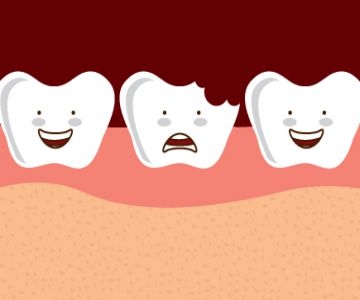Description
What to tell your dentist when you call?
Questions you will be asked when you have a toothache:
- What makes it hurt? Does it keep you awake at night?
- How long has it hurt?
- How much does it hurt?
- Have you been taking anything for the pain?
- What is the location of tooth or pain?
- What symptoms are you having? (swelling, fever, pain)
This is done to determine the type of emergency treatment you require. Make sure to follow up on what the dentist tells you and attend your return appointment.
Remember antibiotics are not the answer for all situations. An antibiotic will only keep the infection from spreading and can be used to rule out sinusitis and other infections outside the tooth.
Antibiotics cannot clear up an infection inside the pulp of a tooth. Taking too many antibiotics can cause you to build up immunity to antibiotic therapy in the future.
Injury to the soft tissue inside the mouth
- These include tear, puncture wounds or lacerations to the cheek, lips or tongue.
- Clean the area right away with warm salt water.
- Bleeding from the tongue can be reduced by pulling the tongue forward and using gauze to place pressure on the wound area.
- Go to the doctor if it needs stitches.
Dental injuries can be prevented.
- Child proof your home.
- Make sure your children are belted safely in their stroller and car seat. Wear helmets while biking, skateboarding & roller blading.
- The whole family uses seat belts.
- Wear a custom made mouth guard while in school sports and during weekend sports activities.
- If you are away from home, be sure to carry your doctor’s business card. If you have a problem, you can call for a telephone consultation so he can help you decide whether you need to seek immediate dental care.
Broken Denture, Bridge, or Plate
- Save all the parts of your broken denture, bridge or partial.
- Call your dentist.
- If it is possible it may be repaired or it may need to be replaced as soon as possible.
Broken/ Fractured/ Chipped tooth or filling
- If the tooth is broken/chipped/fractured and there is no other damage requiring hospital care, go to the dentist within 2-3 hours. Quick action can save the tooth, prevent infection and reduce the need for extensive dental treatment. The dentist can smooth minor chips. The tooth may also be needed to be restored with a composite filling.
- Stop any bleeding by applying direct gentle pressure to the gums. For an upper tooth, apply pressure to the gums above the tooth. For a lower tooth, apply pressure to the gums below the tooth. DO NOT press directly on the broken tooth.
- Rinse the mouth with warm water and apply cold compresses to reduce swelling.
- Find the broken tooth fragments and bring the pieces with you; they may be able to be “cemented” back together.
- To avoid further aggravation from the damaged tooth, place a piece of soft wax into the area that was chipped. You can also try Dentemp or Tempanol for temporary filling material.
- Eat only soft foods. Avoid this side of your mouth when eating. Avoid food and drink that are hot or cold. Eat only lukewarm.

